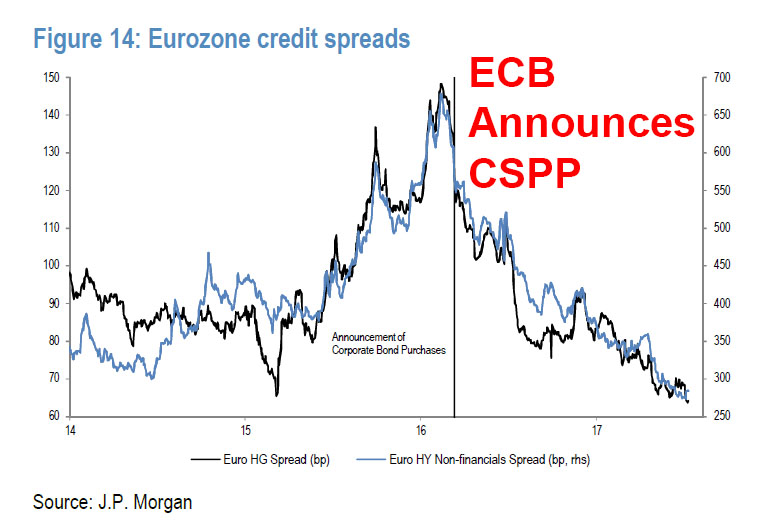Two weeks ago, as part of our continuing coverage of the Steinhoff fiasco in which it emerged that the ECB was the mystery and (not so) proud buyer of just issued Steinhoff (now junk) bonds (maturing in 2025 but set for bankruptcy much sooner) and which lost more than half of their value overnight when it the company announced it was caught in what may be a terminal accounting fraud scandal, we said that “, it seems virtually guaranteed that the banks will suffer steep haircuts on their Steinhoff exposure” and “so will the ECB, which on Friday was rumored it was considering selling its Steinhoff bonds. It is not exactly clear how this would take place, since the ECB’s QE by definition only buys, not sells, at least for now.”
This just barely perceptive shift in the ECB’s posture from “buyer of first, last and only resort” to “potential seller“, has potentially huge implications, and was duly noted by one of the best credit strategists on Wall Street, BofA’s Barnaby Martin, who in a note over the weekend look at the “gift that keeps on giving”, or at least “kept on giving”, and adds to our speculation, writing that “one consistent feature of the last year and a half has been the ECB buying copious amounts of corporate bonds week-in, week out. Such has been the need to promptly restore inflation in the Eurozone – to ensure the debt sustainability of the periphery – that unique monetary policy has been the order of the day. No other central bank has dived headlong into buying corporate bonds. And given the slow return to 2% inflation in Europe, as confirmed by the ECB yesterday, for 2018 we again expect Draghi to be pronounced in buying credit, pushing spreads even tighter.”
We showed the ECB’s unprecedented impact on the bond market this July, when we charted the collapse in Eurozone credit spreads following the announcement of the ECB’s CSPP, or corporate bond buying program.

And while until just two weeks ago, Draghi’s dedication to purchasing virtually any and every piece of (non-junk) corporate paper in Europe was undisputed, “2017 is ending on somewhat of a sour note, in the form of rising idiosyncratic risk…the most distinctive of which has resulted from the Steinhoff bonds.”
While Martin doesn’t see the Steinhoff fiasco as derailing the ECB’s drive to purchase corporate debt next year, “we do see a risk that the CSPP becomes more cautious. The risk, therefore, is that the ECB’s efforts to compress credit spreads is reduced. And if they start to buy more higher quality names then this would weaken the compression trade in corporate bonds next year.”











Leave A Comment